Did the legacy of Rafael Correa in Ecuador come to an end?
The Ecuadorian Prosecutor's Office requires the former president to be linked to a kidnapping investigation

An extradition warrant and preventive arrest was issued by the Ecuadorian Prosecutor for the former president of Ecuador, Rafael Correa, who resides in Belgium today. According to AFP, he described as "a suicide" the return to his country, because he thinks the order is a "plot" by the government to end the opposition.
Leer en español: ¿Llegó a su fin el legado de Rafael Correa en Ecuador?
Lenin Moreno, current president of the South American country, invited his predecessor to appear before the courts, because he assured that Correa is not a political persecuted. However, Correa seems not to trust his successor. In fact, there was a clear distance between them since the current president, who was elected to continue the political project of the second, took office.
Correa is required by the Ecuadorian justice for being linked to the kidnapping, in August 2012, of the opposition Fernando Balda in Bogotá. The former assemblyman was detained for an hour in the Colombian capital, where he was living at the time, after he went IGNORE INTO exile after a conviction against him for the crime of "slanderous insult". This crime was imputed to him in a case against the old party of Correa, Alianza País.
Because the kidnapping was sighted by a witness, who immediately reported the police, Balda was abandoned and later found by Colombian authorities. However, he would be deported because of the conviction against him and at the request of Ecuador, where he would pay his pending sentence.
What does Correa's capture in Ecuador mean?
An eventual capture and prosecution of Correa would, at the institutional level, discredit the hegemony that the former president built during his 10-year term. Although Lenin Moreno was emerging as his favorite successor, Correa lost even the leadership of his party that he founded to promote himself in Ecuadorian politics.
Read also: This is the Latin American country that receives the most refugees
The same former president accused the judicial branch of his country, according to AFP, of not having independence to act. The former president hinted that this has a strong influence of the current government.
The hypothetical trial against Correa only reinforces the thesis that the Ecuadorian justice has distanced itself from the hegemony of 10 years of the previous government. In fact, the popular consultation of 2011, convened by Correa, allowed the restructuring of the judicial branch, creating the Council of the Judiciary, which would eventually choose judges.
What other cases have been presented in Latin America?
The region has seen other examples similar to that of Ecuador, the most prominent case being that of Alberto Fujimori, the former Peruvian president during the 1990s. Fujimori was sentenced in 2009 to 25 years in prison for crimes against humanity and corruption. The former president was captured after a trip from Japan, where he was to avoid judicial accusations, to Chile, where he was extradited to Peru in 2007. Currently, Fujimori is free as in 2017 he received a humanitarian pardon by former President Pedro Pablo Kuczynski .
With very pleasant memories, I share my immense joy of this date with a photo of 35 years ago.
I wish you Happy Father's Day to all the popes of Peru! pic.twitter.com/sgQOpB9KAo– Alberto Fujimori (@albertofujimori) June 17, 2018
In Brazil, the case of Luis Inázio Lula da Silva, president between January 2003 and December 2010, has been one of the most recent episodes. Lula da Silva is sentenced to 12 years in prison for corruption offenses in a prison in Curitiba. During his government, Brazil made important advances for the economy and social issues, tripling the GDP according to the World Bank and taking approximately 30 million people out of poverty.
Amanhã, or ex-president of Uruguai, Pepe Mujica, visits Lula in Curitiba. Mujica, who is also a political prisoner, joins a time of world leaders that demands the liberation of Lula. #LulaLivre pic.twitter.com/ltVfDhBxRB
– Lula (@LulaOficial) June 20, 2018
On the other hand, in Guatemala, former President Otto Pérez Molina has been imprisoned for fraud since 2015. Ricardo Martinelli, former head of state of Panama between 2009 and 2014, is being tried by the Supreme Court of his country for using public funds to spy 150 opponents during his term.
In Presidential House we met with the Minister of the Interior to address issues of criminal incidence. pic.twitter.com/HWHfY2p0nP
– Otto Pérez Molina (@ottoperezmolina) August 23, 2015
In Honduras, former President Rafael Callejas (1990-1994) has been in prison in the United States since 2015, after being implicated in the scandal of electronic fraud in the Fifa Gate scandal as president of the National Autonomous Football Federation of Honduras.
Ollanta Humala, president of Peru between 2011 and 2016, is being investigated along with his wife – Nadine Heredia – for crimes of money laundering and for being splattered with the Odebrecht scandal. They served pretrial detention between July 2017 and May 2018, and are currently at liberty.
History will not change because they decide to criminalize politics, nor because they lock up the leftist and progressive leaders. There is a legacy of those governments that worked tirelessly for their people that they will not be able to erase. My solidarity with @MashiRafael and @LulaOficial
– Ollanta Humala Tasso (@Ollanta_HumalaT) July 4, 2018
Among other examples, Argentina is investigating Cristina Fernández de Krichner (president between 2007 and 2015) for three different processes. Carlos Menem, also an ex-president of Argentina, has a 7-year prison sentence for selling arms in Croatia and Ecuador, although his senatorial jurisdiction protects him from being arrested.
LatinAmerican Post | Iván Parada Hernández
Translated from "¿Llegó a su fin el legado de Rafael Correa en Ecuador?"





